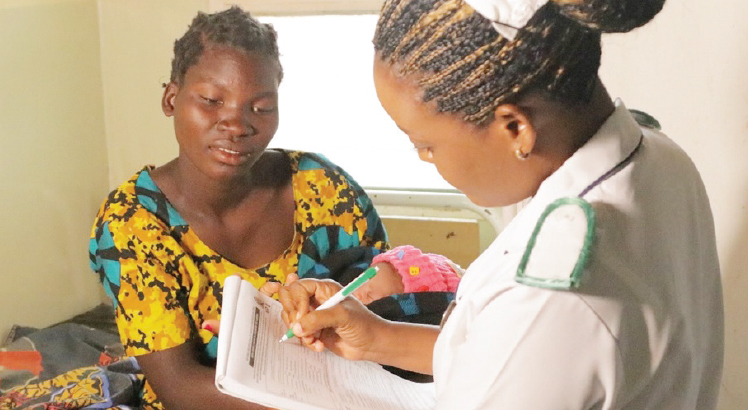‘My child is a full citizen’
Charity John had two names in mind when she went to deliver her first child at Phalombe Health Centre.
The 20-year-old mother, from Maholiya Village under Traditional Authority Mkhumba, delivered a boy named Yafeti on March 3 around 9am.
“If it were a girl, I would have named her Mary,” she said. “When I was pregnant, a nurse advised me to have two names in mind because every child has a right to be registered immediately after birth.”

Done with the first step in fulfillment of the child’s right to legal identity, Charity filled out a birth report form for Yafeti to get a birth certificate required by national and international human rights laws.
The National Registration Act enacted in 2010 makes birth and death registration mandatory for inclusive development.
Similarly, Article 7 of the Convention on the Rights of the Child guarantees every child’s right to be registered shortly after birth with a name and nationality. This helps the child to be recognised as a person in line with Article 6 of the Universal Declaration on Human Rights.
Charity does not want her son to lag behind in the global Sustainable Development Goals to ensure everyone is registered by 2030.
“At first, I wasn’t aware of the importance of birth registration, but now I know this simple process gives my baby a great start in his life. It links him to me as his mother and will help him access vital services like any other Malawian,” she narrates.
Charity and her husband, a 22-year-old tobacco farmer, cannot wait to receive a birth certificate for their maiden child.
“The certificate will distinguish him as our child and true Malawian deserving public services, including protection, regardless of where he lives or goes,” she explains, embracing him tightly.
Unicef is supporting Malawi Government’s target to register at least half of all children aged below five by 2023.
Unicef child protection specialist Ambonishe Mwalwimba says: “Birth registration is one of the priority outcomes in the Unicef country development programme for 2019 to 2023.
“This is a cross-cutting issue in most of the social and child protection programmes the country office supports, including education, child health and ending child marriage.”
The support included training caregivers and birth registration focal persons in all health facilities with maternity services in the process and the requirement to record every birth, even in communities.
“We encourage the parents to have a name in mind prior to giving birth so that they can easily fill the birth report before taking the baby home. If they are not sure of the sex of the unborn, they need to have two suggested names,” says nursing officer Ellen Kazembe Crusoe.
She reckons the demand was stumpy due to low awareness of the benefits of birth registration for children and their families.
“To comply with the law, when a woman comes to deliver, we share with her the benefits of birth registration and steps to follow for the newborn to get a birth certificate,” says the health worker.
Phalombe started issuing birth certificates in 2016, according to district registration officer Nil Kalonga.
The National Registration Bureau (NRB) official backs demands for parents to have two names handy before a child is born, once a taboo for Charity and many Malawians.
“We don’t want a parent to say we will name the baby later because it disrupts the birth registration system,” he says. “To register every birth, we trained some health workers and deploy our staff to prenatal clinics in communities to unpack the birth registration process and why it matters.”
Birth registration links every child with its parent. The form filled by Charity and her husband has boxes for the parent’s name, place of residence, nationality and national identity card number.
“If the national register contains a couple of people with the same name, we can pinpoint the child we want and its parents. This precision makes every registered child count and be counted,” Kalonga explains.
NRB and the Ministry of Health are working with traditional authorities and village heads to register every birth and distribute the certificates close to where the children live.
From January to March, Phalombe registered 5 960 children, including 5 898 children born with the help of skilled birth attendants in health facilities and 62 born perilously in communities.
The quarterly count constitutes just about a third of the 14 180 children registered last year.
Kalonga states: “Birth registration creates a child’s legal identity, ensuring that one counts in the decisions of the district, region and country.
The government cannot provide for children who have not been counted. In fact, unregistered children put pressure on service delivery because they scramble for resources set aside for those registered.”
And Charity is happy that Yafeti will soon have a certificate that legally proves his identity, age and nationality.
“My son is a full citizen. When he turns six, he will require the certificate to show teachers that he is old enough to start Standard One,” she brags.





